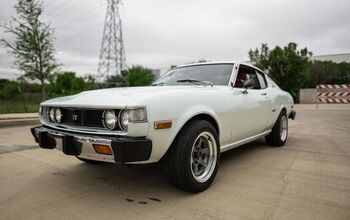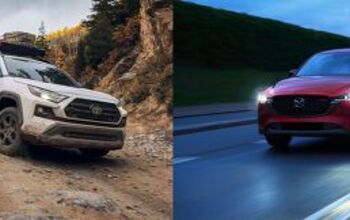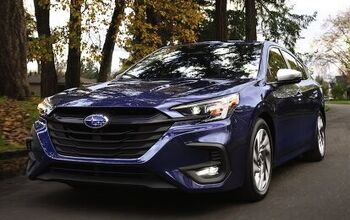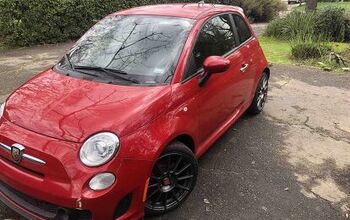The Big 2.8 Make Their Own Bad Luck
Daniel Howes thinks Detroit is jinxed. In his latest column, “Automakers vexed by external forces,” the Detroit News scribe suggests that The Big 2.8 are latter day Joe Btfsplks, doomed to walk through life with a dark cloud hanging over their collective heads. Just as they're improving their products and cutting production costs, the domestic automakers have become hapless victims of slowing economic growth, rising oil prices and a soft housing market. It's the "Motown curse." Or, as I like to call it, another peg upon which a loser may hang his hat.
"As much as the fundamental gains in this year's contract talks remain," Howes writes. "The queasy reality is that no matter what Detroit's Big Auto and Big Labor managed to achieve, their gains could be swamped by economic forces beyond their control." True but— It’s not bad luck. It’s bad planning. If America’s soaring gas prices and slumping housing market are about to "swamp" The Big 2.8’s best-laid plans, why is Toyota forecasting growth?
Because Detroit’s plans aren’t best laid. They’re, well, I think you know what I was about to say. Despite Howes’ proxy prevarication, Motown’s predicament relative to the current economic downturn isn’t a case of “when a bad economy happens to a good company.” These are simply the times that test an automakers’ soul, and Detroit’s is about to be found wanting. Again. Once again the Big 2.8 are caught flat-footed thanks to their inability to think or plan for the long-term. And in the long term, that’s ALWAYS a recipe for disaster.
Anyone remember the K-car? When the K helped pull the “Crisis Corporation” back from the brink of oblivion, Chrysler took the winning platform and milked it to death, using it for everything from minivans to luxury cars. Management gave two divisions identical vehicles with different badges– and then killed one of them because of plummeting sales. Again and again, great Chrysler products withered from years of neglect. “Cab forward" design anyone?
And what of the Town Car? Lincoln’s passenger product poured billions into Ford’s corporate coffers— which FoMoCo used to purchase brands they didn’t need, whose products then suffered from the cold dead hand of Ford’s erstwhile international brand management and leaden, impenetrable bureaucracy. Meanwhile, the engine of this excess was left to wither and rot on the vine, along with its similarly profitable Panther platform partners.
Mr. Howes might say all this is old news. The “new Detroit” has learned its lesson. And ain’t it a bitch: just when they’ve finally accepted what anyone with half a brain has known all along (like, say, Toyota), BANG! Fate kneecaps them.
Howes’ presupposition is fundamentally flawed. Detroit shows no evidence that it’s learned from its mistakes. Why did the K-car creator just kill the PT Cruiser, a vehicle with a huge following (and no significant update in the last eight years)? Where is the “new” Chrysler 300? While you can't argue with CEO Nardelli's desire to strip and flip rationalize his company's model lineup, where’s the long term commitment to the only thing that can sustain their business: product excellence? The same place it’s always been: nowhere.
Check out Ford’s new Lincoln MKS. It’s yet another travesty-on-wheels: a tarted-up something else rather than a glorious original, a car that embodies the values of a once proud brand, sold at the proper price point. GM’s effort to leverage its global assets to reinvigorate its U.S. brands is equally pathetic. They import cars from here and there without any coherent idea of who should get what and why—as witnessed by their continued insistence on badge engineering everything with even a glimmer of sales success.
"The wild card in Detroit's collective turnaround has never been what it can control," Howes notes. "It's been what it mostly can't, which is everyone else." You can almost hear Warren Zevon belting-out “Poor Poor Pitful Me”— only without the irony. All of us have had to deal with factors beyond our control. But Detroit had control over the decisions that got them to where they are today: a leaf blowing in an economic whirlwind. Or you could say, the stronger your hand, the less trouble a wild card will cause.
Blaming Detroit's current plight on forces beyond their control is like saying it was bad luck that a mountain climber without a map got lost. When times are tough, the weak are the first to go. I feel sorry for all the people caught-up in Detroit’s decline— from Howes’ “poor slobs who hold mortgages” to the downtrodden creatives who know what could have been. But it’s not like survival of the fittest is a new rule. Or that no one in the industry understood that the “fittest” automaker is the one selling the best cars at the best price.
Detroit’s weak because its brand and products are weak. Blaming external factors for this predicament is a loser’s game. One that Detroit’s knows all too well, and shows no sign of abandoning.
More by Frank Williams
Latest Car Reviews
Read moreLatest Product Reviews
Read moreRecent Comments
- Bd2 If I had time to watch other people driving, then I would go for LMP.
- Steve Biro There are 24 races on this year’s F1 schedule. And I guarantee you no more than two will be reasonably exciting, Meanwhile, F1’s reception for Andretti reveals the dark underbelly of the sport. I have followed F1 since the 1960s and, frankly, I am running out of interest. I’ll catch a race if it’s convenient but won’t bother DVRing them.
- YellowDuck Been watching since the 80s, seriously since the 90s once we had reliable TV coverage. I'm in Canada though. Hey, and don't forget that the Interlagos race is also in a convenient time zone, as is Mexico. So that's 5 races in the Americas. Absolutely love it, but it takes a bit more interest in the technical / strategic side of things to really appreciate it. It's not just going fast in circles until someone crashes into someone else, while drunk people watch. The US can be proud of what it has contributed - Austin is one of the best tracks on the calendar, Vegas turned out to be much better than anyone could have hoped, and even Miami - a real Indy car-style track - produced a good race this year.
- JMII I watch every F1 race, same with Indycar which is 100X better in terms of actual racing.
- Dale Quelle surprise.


































Comments
Join the conversation